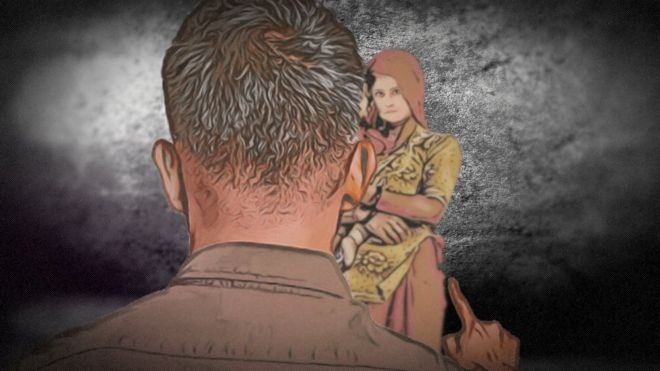
AKIPRESS.COM - With much of the world on coronavirus lockdown, there are warnings that those living with domestic abuse could become hidden victims of the pandemic.
In the UK, calls to the national abuse hotline went up by 65% this weekend, according to the domestic abuse commissioner for England and Wales. Meanwhile, the UN has warned that women in poorer countries and smaller homes are likely to have fewer ways to report abuse.
The BBC has spoken to two women who are currently under lockdown with men who they say have abused them.
Geeta, India
This interview was conducted the day before India announced a 21-day complete lockdown in order to curb the spread of coronavirus. See full interview here
Geeta wakes up at 5am, her husband is lying next to her on the floor. He's snoring loudly.
The previous night he had come home drunk and upset. The coronavirus outbreak meant fewer people were using public transport, so as an autowallah, or rickshaw driver, Vijay's income had dropped from 1,500 rupees a day (just over £16), to 700 rupees a day.
"How many days will be like this?" he'd shouted, throwing a bottle of the spirit he'd been drinking against the wall. Geeta's children scrambled behind her for shelter.
Thankfully, Vijay climbed onto the small mattress the whole family share and fell asleep soon after his outburst.
"It took a while to calm the children," says Geeta. "They've seen their father angry many times in their life but the past few weeks it has been worse. They've seen him throw things against the wall and pull me by the hair."
Geeta's husband has hit her more times than she can remember, the first time on their wedding night. She tried to leave him once, but he wouldn't let her take the children.
They live in a low-income neighbourhood, called a mohalla, in a rural area.
On a typical day she would walk a kilometre to the nearest well to fetch water for the day. Once she had taken it home, she'd chat with neighbours waiting for the grocer to arrive with his cart of vegetables.
After buying the household food for the day, Geeta would start preparing breakfast. Her husband would leave at around 7am, returning for lunch and a nap, leaving again after the two older children returned from school.
"But things changed when the school closed on the 14th," she says. "Then the children were home constantly and they began to irritate my husband.
"Usually he saves his anger for me, but he has begun to yell at them for minor things like leaving a cup on the floor. I then say something to divert his attention so he can be angry at me, but the more time we are together, the less I can think of to distract him."
Geeta had a plan. While her husband was at work, and after cleaning the house, she would walk to a nondescript office building just outside the neighbourhood.
There she used to attend a secret class set up by community organisers where women learn to sew, read and write.
Geeta wants to get enough skills to be financially independent and move out with her children. At the class, she also met with counsellors who are trained to help domestic violence victims.
But India's 21-day lockdown, which began on 24 March, has put a stop to this. The classes have ended and it's impossible for community counsellors to visit vulnerable women.
Vimlesh Solanki, a volunteer for a Sambhali Trust, an organisation that supports women in Jodhpur, the second largest city in Rajasthan, says coronavirus has put women in danger.
"A complete lockdown means every day is completely disturbed. There are now no local grocers with carts so they need to travel further to the supermarket for food every day.
"Stressful situations like this means that there are more things that trigger their already abusive partners."
